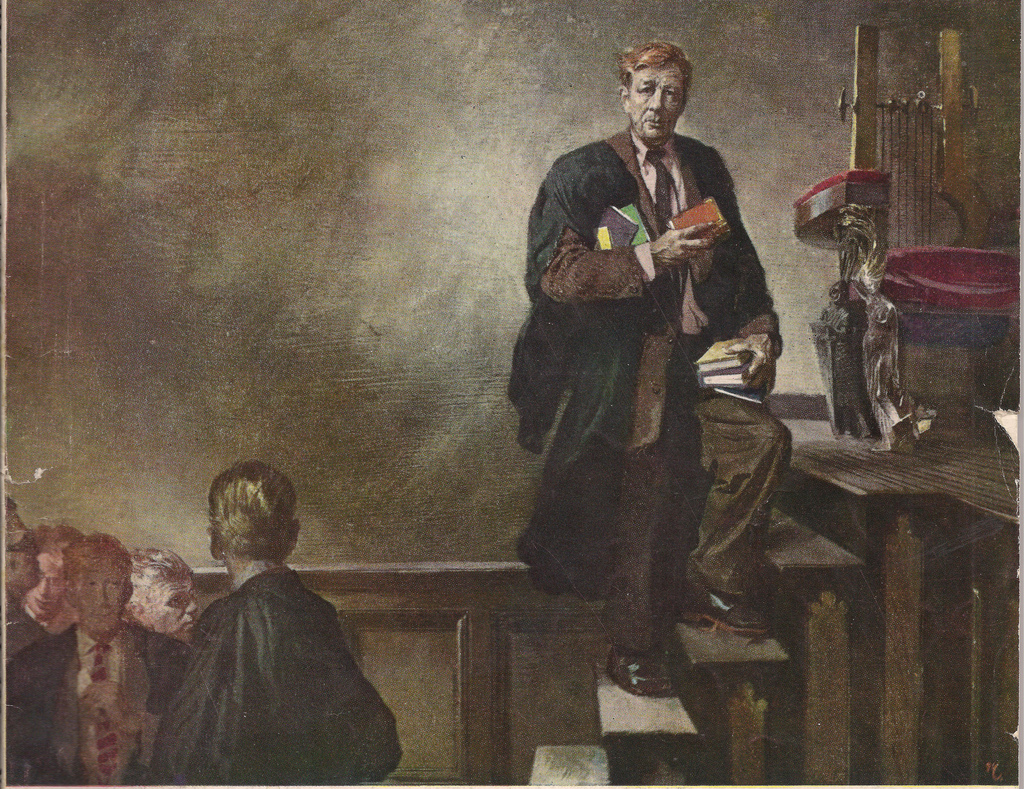
The habit-forming pain,
Mismanagement and grief:
We must suffer them all again.
These words were written by a gay man—a man who had recently met the love of his life, a man who did not feel safe to speak openly about this love, a man under threat of incarceration and violence because of this love. These words were written by a man facing news of tragedy—a horror caused by politicians’ greed and stupidity and inability to live in peace, a horror which he’d been through before, a horror which seemed to be repeating itself in a nightmarish, unstoppable cycle.
These words are W.H. Auden’s. They are from his poem “September 1, 1939,” written on the eve of World War II.
America loves this poem. We turn to it in moments of national mourning. It was ubiquitous after the 9/11 attacks. Politicians quoted it. Newspapers reprinted it. I myself have shared it with students and on social media during each of the recent mass shootings.
When we reach for the comfort of this poem, we don’t usually leave time to discuss Auden’s sexuality. We don’t pause to decode the poem’s references to the struggle of being queer in the 1930s. In fact, in some versions reprinted after September 11th, 2001, all sections that hinted at this were snipped out.
These references are obscure, so they probably just seemed confusing and off-topic. (Remember Auden, as a British citizen, lived under threat of criminal prosecution for sodomy—references to his homosexuality had to be coded. This was more than a stylistic choice.)
Nothing hateful was meant by the shortening of the poem, right? It just seems pointless to bring up Auden’s queer identity, right? Pointless to acknowledge that the first line, “I sit in one of the dives /on Fifty-second Street” is most likely a reference to a gay bar. What good would it do, bringing that up? After 9/11, it probably seemed like an irrelevant detail. In the wake of the Orlando shooting at Pulse nightclub, it seems less so.
You can posit that an author’s sexual orientation is nobody’s business, or claim we shouldn’t bring biography into art. But we live in a society where straight is default, so to say nothing is to imply heterosexuality.
So with a writer like Auden (or Whitman or Dickinson or Shakespeare or Woolf or Cather or Bowie or St. Vincent Millay or Oliver or Cohen or Ocean or Jónsi), to say nothing is to be complicit in a lie of omission.
This lie is convenient, as most lies tend to be. It lets readers absorb all the beauty and comfort and strength of a poem without ever even knowing that they’ve been identifying—on a personal, emotional level—with a queer writer. Many Americans who drew strength from Auden’s poem in 2001 never had the opportunity to grapple with the fact that its author was queer, simply because they didn’t know.
When we read, we are in someone else’s head for a minute. Through this mind-boggling miracle that is literature, we learn to listen to voices other than our own. We develop empathy.
Some might say, oh, let me just enjoy the beauty of this art without worrying about its context. Nope. You don’t get that luxury. Our country has an empathy deficiency. Does that sound dramatic? Consider the conservative churches who wondered “how to respond” to the mass murder at Pulse, or worse, responded with hate. Consider that threats toward the Muslim community in Orlando have already begun.
Queer voices are already included on required reading lists in nearly every high school. These could be a powerful weapon against hate and ignorance, but we can’t activate that power unless we acknowledge the sexuality of the authors we teach. (And of course, we need to drastically increase the diversity of those reading lists, too.)
If you’re familiar with “September 1, 1939,” you’ve probably heard that Auden later disowned his poem. The line he hated most was “we must love one another or die” because, he said, “we die anyway.”
Here’s the stanza in its original form:
All I have is a voice
To undo the folded lie,
The romantic lie in the brain
Of the sensual man-in-the-street
And the lie of Authority
Whose buildings grope the sky:
There is no such thing as the State
And no one exists alone;
Hunger allows no choice
To the citizen or the police;
We must love one another or die.
I can see why Auden would write off that last line. After the war, it must have seemed so naïve. And the famous image in the poem’s final stanza—lights dotting a dark horizon—can feel a little pat in the face of so much tragedy.
The poem has value, though. Maybe not so much to comfort, but to challenge. When I read the line “all I have is a voice / to undo the folded lie,” I think of the many “folded lies” we face today: the NRA’s bizarre grip on our legislation, bigotry thinly disguised as patriotism, religion being twisted to justify both hate crimes and hateful responses. And the folded lie of heteronormativity that continues to be told through the censorship and casual omission of queer voices, both in literature and in life.
So many lies, folded up so tightly. It is overwhelming. That’s probably why Auden wrote (and why most of us still like) that comforting-if-slightly-illogical line about love.
We can’t undo all the lies at once. But we can honor Auden’s voice. Re-read “September 1, 1939,”—all of it—and remember it was written in a gay bar; read it in remembrance of the 50 beautiful lives cut horrifically short on a Sunday morning in a gay bar. And when you finish the poem, spend some time reading the stories of the victims. Find yourself in these stories, even if—especially if—they are different from your own. Mourn for each lost voice. Mourn for all of us.
 Nothing Gold Can Stay
Nothing Gold Can Stay